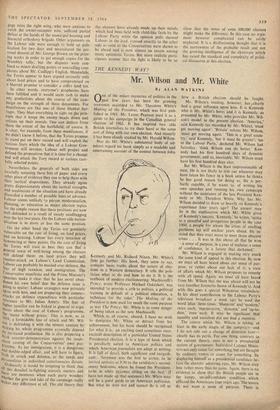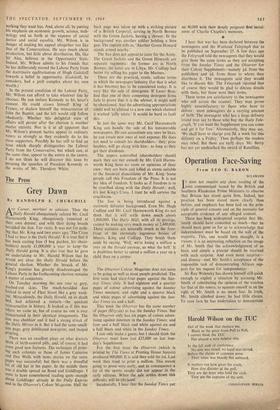THE KENNEDY WAY?
Mr. Wilson and Mr. White
By ALAN WATKINS
ONE of the minor mysteries of politics in the past few years has been the growing reverence accorded to Mr. Theodore White's Making of the President, which was first pub- lished in 1961. Mr. Lester Pearson used it as a guide to his campaign in the Canadian general election of 1962. It has inspired two able British journalists to try their hand at the same sort of thing with our own election. And recently it has been closely studied by Mr. Harold Wilson.
Nor do Mr. White's substantial body of ad- mirers regard his book simply as a readable and entertaining account of the contest between John
Kennedy and Mr. Richard Nixon. Mr. White's fans go further. His book, they seem to say, contains basic truths about the nature of elec- tions in a Western democracy. It tells the poli- tician what to do and how to do it. It is the textbook of modern electioneering. Machiavelli's Prince, wrote Professor Michael Oakeshott, was intended 'to provide a crib to politics, a political training in default of a political education, a technique for the ruler.' The Making of the President is now used for much the same purpose as was The Prince. Mr. White is in some danger of being taken as the new Machiavelli.
Which is, of course, absurd. I have no wish to denigrate Mr. White or detract from his achievement, but his book should be recognised for what it is: art exciting (and sometimes over- excited) description of a particular United States Presidential election. It is a type of book which is peculiarly suited to American politics and which American .journalists are adept at writing. It is full of detail, both significant and insignifi- cant: 'Sorensen was the first to arrive, to be invited upstairs at 9.30 to the candidate's second- storey bedroom, where he found the President- to-bc in white pyjamas sitting on the bed.' (I have not made up that sentence.) Mr. White may still be a good guide to an American politician. But what he does not and cannot do is tell us how a British election should be fought.
Mr. Wilson's reading, however, has ,clearly had a great influence upon him. It is Kennedy who is Mr. White's hero; and it is Kennedy, as presented by Mr. White, who provides Mr. Wil- son's model in the present election. 'America.' said Kennedy (as recorded by Mr. White), 'must get moving again'; 'Britain' echoes Mr. Wilson, `must get moving again.' This is a great coun- try,' said Kennedy, 'but it must be greater'; 'we in the Labour Party,' declared Mr. Wilson last Saturday, 'think Britain can do better.' Ken- nedy had his first hundred days of dynamic government; and so, inevitably, Mr. Wilson must have his first hundred days also.
But Mr. Wilson is the least impressionable of men. He is not likely to trot out whatever may have taken his fancy in a book unless he thinks he has good reason for doing so. He is per- fectly capable, if he wants to, of writing his own speeches and running his own campaign without the assistance of the late President Ken- nedy or Mr. Theodore White. Why has Mr. Wilson decided to draw so heavily on Kennedy's experience four years ago? The answer may lie in the explanation which Mr. White gives of Kennedy's success. 'Kennedy,' he writes, 'spoke to a peaceful and prosperous people in the year 1960, a people for whom the crises of swelling problems lay still unclear years ahead. He in- sisted that they must move to meet those obscure crises . . It was in this above all that he won - -a sense of purpose, in a year of malaise; a sense of confidence, in a future that darkened.'
Mr. Wilson is engaged in making very much the same kind of appeal in this election. By now we must all have heard about our sense of pur- pose, or rather about our lack of it; a state of affairs which Mr. Wilson proposes to remedy with all speed. Again, we must all have heard from Mr. Wilson that the way ahead will not be easy (another favourite theme of Kennedy's). And with this goes a special Wilsonian vocabulary. In his short contribution to the Labour Party's television broadcast a week ago he used the word 'plan' three times; 'blueprint' and 'modern,' twice each; 'regeneration.' dynamic' and `up-to- date,' once each. It may be significant that equality and socialism did not find a mention.
The course which Mr. Wilson is taking, at least in the early stages of the campaign--and I do not rule out a change of direction later— clearly has its perils. For one thing, contrary to the current theory, ours is not a presidential system of government. Individual Cabinet Minis- ters not only count for something, but are thought by ordinary voters to count for something. By displaying himself as a presidential candidate be- fore the electors' admiring eyes, Mr. Wilson may lose rather more than he gains. Again, there is no evidence to show that the British people are in the jumpy, un-selfconfident condition which afflicted the Americans four years ago. The voters do not want• a sense of purpose. There is nothing they want less. And, above all, by putting his emphasis on economic growth, science, tech- nology and so forth at the expense of social justice and social equality, Mr. Wilson is in danger of making his appeal altogether too like that of the Conservatives. He says much about production, but little about distribution. He, like Sir Alec, believes in the Opportunity State. Indeed, Mr. Wilson admits to his friends that he has deliberately moved the Labour Party from the doctrinaire egalitarianism of Hugh Gaitskell towards a belief in opportunity. (Gaitskell, he considers, had a guilt complex about his own wealth.) In the present condition of the Labour Party, Mr. Wilson can afford to take whatever line he chooses. He can imitate Kennedy to his heart's content. He could crown himself King of France, or declare himself the reincarnation of John the Baptist, and the left would still follow obediently. Whether this delightful state of affairs will persist after the election is another matter entirely. Nor is it at all apparent that Mr. Wilson's present tactics appeal to ordinary voters as strongly as they evidently do to his close supporters. Possibly he has still to find an issue which sharply distinguishes the Labour Party from the Conservative, but which can, at the same time, appeal to the voters in the centre. I do not think he will discover this issue by perusing the speeches of President Kennedy or the works of Mr. Theodore White.



































 Previous page
Previous page